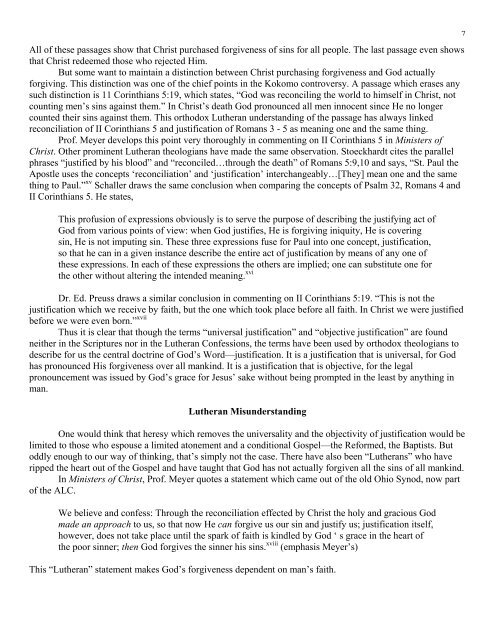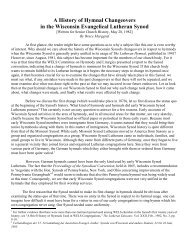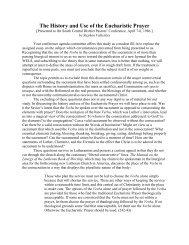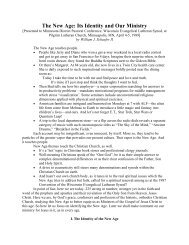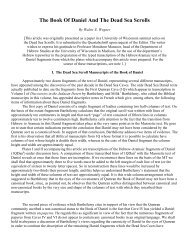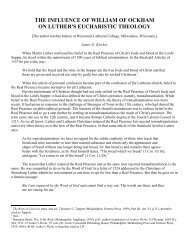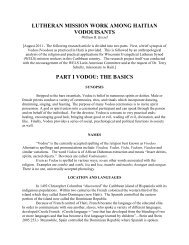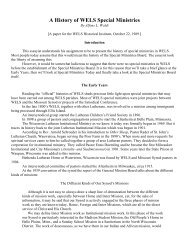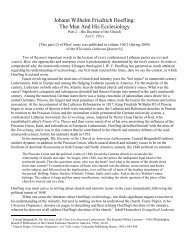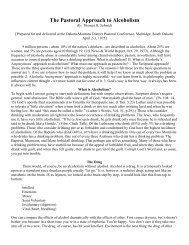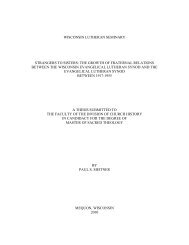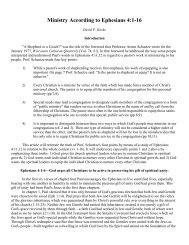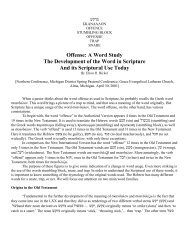Universal and Objective Justification with Special Emphasis on a ...
Universal and Objective Justification with Special Emphasis on a ...
Universal and Objective Justification with Special Emphasis on a ...
Create successful ePaper yourself
Turn your PDF publications into a flip-book with our unique Google optimized e-Paper software.
All of these passages show that Christ purchased forgiveness of sins for all people. The last passage even shows<br />
that Christ redeemed those who rejected Him.<br />
But some want to maintain a distincti<strong>on</strong> between Christ purchasing forgiveness <str<strong>on</strong>g>and</str<strong>on</strong>g> God actually<br />
forgiving. This distincti<strong>on</strong> was <strong>on</strong>e of the chief points in the Kokomo c<strong>on</strong>troversy. A passage which erases any<br />
such distincti<strong>on</strong> is 11 Corinthians 5:19, which states, “God was rec<strong>on</strong>ciling the world to himself in Christ, not<br />
counting men’s sins against them.” In Christ’s death God pr<strong>on</strong>ounced all men innocent since He no l<strong>on</strong>ger<br />
counted their sins against them. This orthodox Lutheran underst<str<strong>on</strong>g>and</str<strong>on</strong>g>ing of the passage has always linked<br />
rec<strong>on</strong>ciliati<strong>on</strong> of II Corinthians 5 <str<strong>on</strong>g>and</str<strong>on</strong>g> justificati<strong>on</strong> of Romans 3 - 5 as meaning <strong>on</strong>e <str<strong>on</strong>g>and</str<strong>on</strong>g> the same thing.<br />
Prof. Meyer develops this point very thoroughly in commenting <strong>on</strong> II Corinthians 5 in Ministers of<br />
Christ. Other prominent Lutheran theologians have made the same observati<strong>on</strong>. Stoeckhardt cites the parallel<br />
phrases “justified by his blood” <str<strong>on</strong>g>and</str<strong>on</strong>g> “rec<strong>on</strong>ciled…through the death” of Romans 5:9,10 <str<strong>on</strong>g>and</str<strong>on</strong>g> says, “St. Paul the<br />
Apostle uses the c<strong>on</strong>cepts ‘rec<strong>on</strong>ciliati<strong>on</strong>’ <str<strong>on</strong>g>and</str<strong>on</strong>g> ‘justificati<strong>on</strong>’ interchangeably…[They] mean <strong>on</strong>e <str<strong>on</strong>g>and</str<strong>on</strong>g> the same<br />
thing to Paul.” xv Schaller draws the same c<strong>on</strong>clusi<strong>on</strong> when comparing the c<strong>on</strong>cepts of Psalm 32, Romans 4 <str<strong>on</strong>g>and</str<strong>on</strong>g><br />
II Corinthians 5. He states,<br />
This profusi<strong>on</strong> of expressi<strong>on</strong>s obviously is to serve the purpose of describing the justifying act of<br />
God from various points of view: when God justifies, He is forgiving iniquity, He is covering<br />
sin, He is not imputing sin. These three expressi<strong>on</strong>s fuse for Paul into <strong>on</strong>e c<strong>on</strong>cept, justificati<strong>on</strong>,<br />
so that he can in a given instance describe the entire act of justificati<strong>on</strong> by means of any <strong>on</strong>e of<br />
these expressi<strong>on</strong>s. In each of these expressi<strong>on</strong>s the others are implied; <strong>on</strong>e can substitute <strong>on</strong>e for<br />
the other <str<strong>on</strong>g>with</str<strong>on</strong>g>out altering the intended meaning. xvi<br />
Dr. Ed. Preuss draws a similar c<strong>on</strong>clusi<strong>on</strong> in commenting <strong>on</strong> II Corinthians 5:19. “This is not the<br />
justificati<strong>on</strong> which we receive by faith, but the <strong>on</strong>e which took place before all faith. In Christ we were justified<br />
before we were even born.” xvii<br />
Thus it is clear that though the terms “universal justificati<strong>on</strong>” <str<strong>on</strong>g>and</str<strong>on</strong>g> “objective justificati<strong>on</strong>” are found<br />
neither in the Scriptures nor in the Lutheran C<strong>on</strong>fessi<strong>on</strong>s, the terms have been used by orthodox theologians to<br />
describe for us the central doctrine of God’s Word—justificati<strong>on</strong>. It is a justificati<strong>on</strong> that is universal, for God<br />
has pr<strong>on</strong>ounced His forgiveness over all mankind. It is a justificati<strong>on</strong> that is objective, for the legal<br />
pr<strong>on</strong>ouncement was issued by God’s grace for Jesus’ sake <str<strong>on</strong>g>with</str<strong>on</strong>g>out being prompted in the least by anything in<br />
man.<br />
Lutheran Misunderst<str<strong>on</strong>g>and</str<strong>on</strong>g>ing<br />
One would think that heresy which removes the universality <str<strong>on</strong>g>and</str<strong>on</strong>g> the objectivity of justificati<strong>on</strong> would be<br />
limited to those who espouse a limited at<strong>on</strong>ement <str<strong>on</strong>g>and</str<strong>on</strong>g> a c<strong>on</strong>diti<strong>on</strong>al Gospel—the Reformed, the Baptists. But<br />
oddly enough to our way of thinking, that’s simply not the case. There have also been “Lutherans” who have<br />
ripped the heart out of the Gospel <str<strong>on</strong>g>and</str<strong>on</strong>g> have taught that God has not actually forgiven all the sins of all mankind.<br />
In Ministers of Christ, Prof. Meyer quotes a statement which came out of the old Ohio Synod, now part<br />
of the ALC.<br />
We believe <str<strong>on</strong>g>and</str<strong>on</strong>g> c<strong>on</strong>fess: Through the rec<strong>on</strong>ciliati<strong>on</strong> effected by Christ the holy <str<strong>on</strong>g>and</str<strong>on</strong>g> gracious God<br />
made an approach to us, so that now He can forgive us our sin <str<strong>on</strong>g>and</str<strong>on</strong>g> justify us; justificati<strong>on</strong> itself,<br />
however, does not take place until the spark of faith is kindled by God ‘ s grace in the heart of<br />
the poor sinner; then God forgives the sinner his sins. xviii (emphasis Meyer’s)<br />
This “Lutheran” statement makes God’s forgiveness dependent <strong>on</strong> man’s faith.<br />
7


